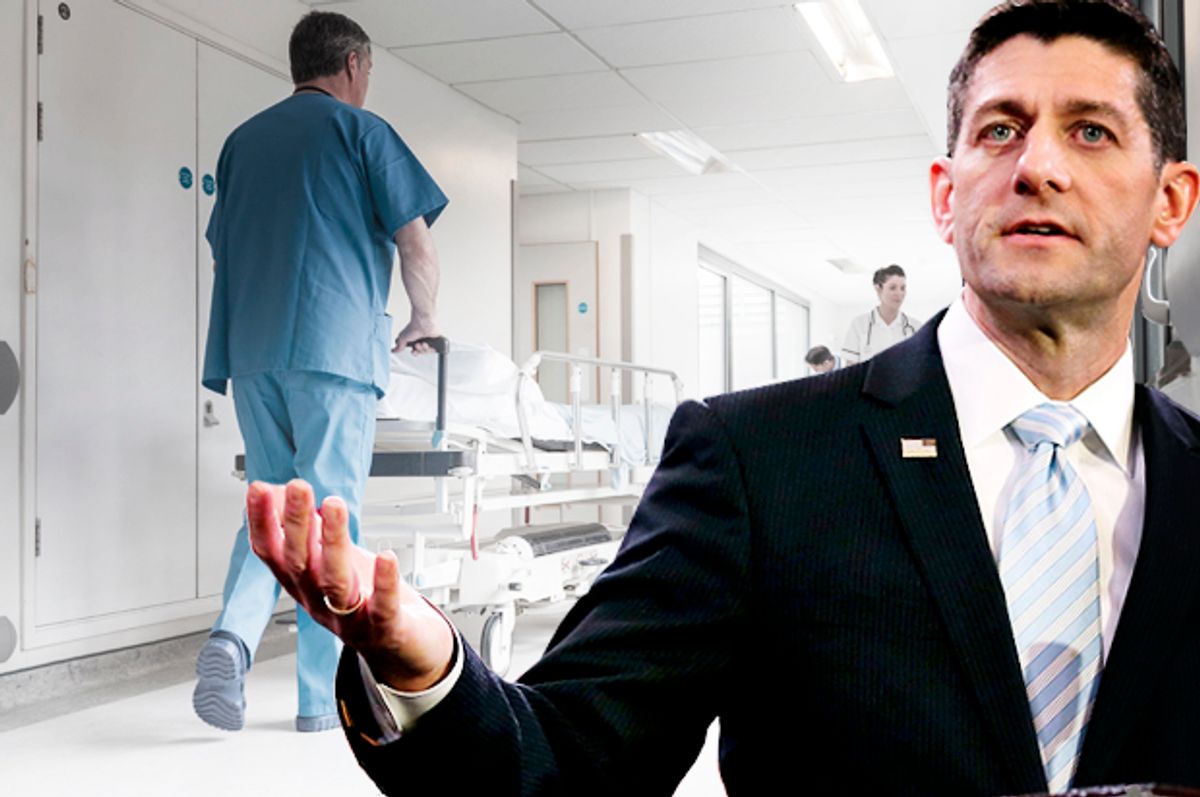As the House Republicans' repeal-and-replace plan for Obamacare slowly creeps its way into becoming law, an important question lingers: How will it impact ordinary Americans?
"Their current bill keeps in parts of the ACA that are very popular," Maura Calsyn, managing director for health policy at Center for American Progress, told Salon. "In addition to these popular reforms, the current bill keeps many of the ACA’s more technical changes to other parts of the health care system, such as reforms to Medicare."
But much of what made the ACA so effective for so many Americans is going to be jettisoned.
"The big piece that everybody is going to be talking about going is the individual mandate," Calsyn explained. "But getting rid of the individual mandate creates problems for the insurance market. Republicans are misleading the public about keeping many of the law’s consumer protections. That is because having a mandate allows the ACA to include such strong consumer protections, because the mandate increases the number of healthy people in the insurance market. Without a mandate, people could just buy insurance when they get sick, which raises costs for everyone. The current bill instead includes a 'continuous coverage' provision. That means that if you lose your insurance for three months, the insurer can then charge you more. That doesn’t provide the same incentive to buy insurance as the mandate does."
Calsyn added, "Another big part that will change a lot is the ACA's tax credits. The repeal bill gives people smaller tax credits. And instead of linking them to the cost of insurance and your income, they will be based on age. They are also eliminating the law’s cost-sharing subsidies, which lower out-of-pocket costs for the lowest-income people who buy health care insurance on the marketplaces. If you have too high of an income to qualify for the Medicaid expansion, in addition to getting tax credits to help pay your premiums, the Affordable Care Act also provides additional money to help you pay for other insurance costs, like your deductibles or co-payments at doctor’s offices."
Calsyn also observed that "many people will only be able to buy very skimpy insurance, because the repeal bill eliminates the requirement that plans must provide specified levels of actuarial value. The actuarial value means the percentage of cost for a typical person that the health plan needs to cover. So if your plan has an AV of 60, that means that the health plan is designed to pay 60 percent of the benefits and the patient is on the hook for 40 percent. Without these requirements, insurers can offer very bare-bone plans that do not offer any real protections."
Finally, Calsyn noted that "in addition to these changes that will hurt people enrolled in the ACA’s marketplaces, the other biggest change is the end of the ACA’s Medicaid expansion in 2020. Twelve million people have gained insurance through this program. But the bill would eliminate the funding that makes it possible, for all new enrollees after 2020."
The deleterious effects of the Obamacare repeal will not be limited to health care alone.
"This bill repeals the Prevention and Public Health Fund, which provides 12 percent of the CDC’s budget," said John Auerbach, President and CEO of Trust for America's Health. "Without that $1 billion, the CDC — which has responded to more than 750 health emergencies in the past two years — will have to do more with less. This is at a time when new infectious diseases — from Ebola to Zika to Bird Flu — emerge frequently. For the ordinary American, many things they take for granted, such as the ease of obtaining vaccines, will be made difficult — the Prevention Fund provides 40 percent of the CDC’s immunization program funding. Quite simply, this bill would make untold numbers of Americans less safe, secure and healthy."

Shares